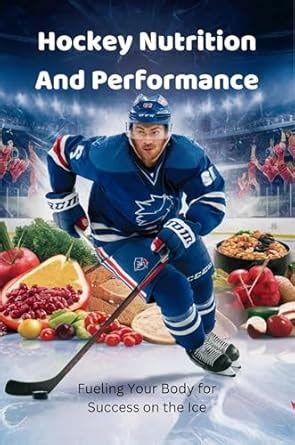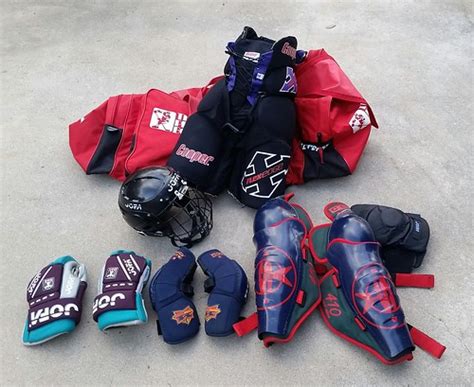Discover essential hockey nutrition tips, from key nutrients and meal timing strategies to hydration and recovery, to enhance your athletic performance on ice.In the fast-paced world of hockey, every athlete knows that performance on the ice is not solely about skill—it’s also heavily influenced by nutrition. Proper fueling through a tailored diet can significantly enhance energy levels, stamina, and recovery, ultimately giving players the competitive edge they need. In this article, we’ll delve into the essential components of hockey nutrition, exploring key nutrients to incorporate, effective meal timing strategies, and crucial hydration tips. We’ll also address post-game nutrition essentials for optimal recovery, ensuring that athletes are ready to give their best in every game. Whether you’re a seasoned pro or just starting out, understanding and implementing these nutritional strategies can elevate your game to new heights. Join us as we uncover the crucial link between nutrition and peak hockey performance!
Understanding The Importance Of Hockey Nutrition For Athletes
Hockey nutrition: is a crucial aspect of an athlete’s performance on the ice. The right balance of nutrients can significantly impact endurance, strength, and overall game readiness. A well-planned diet helps players maintain energy levels throughout intense practice sessions and games, enabling them to perform at their best. Understanding the importance of hockey nutrition: can lead to better training outcomes and extended athletic careers.
A successful hockey player requires not only physical skills but also proper fueling strategies. The unique demands of the sport, which include speed, agility, and strength, necessitate specialized nutritional approaches. By focusing on adequate energy intake, players can enhance their performance and reduce the risk of injury.
Key Reasons Why Hockey Nutrition Is Essential
- Energy Supply: Players burn a substantial amount of calories during games and training, making it vital to replenish energy stores through a nutrient-dense diet.
- Muscle Recovery: Consuming the right nutrients post-game helps in repairing muscle tissue, reducing soreness and preparation for the next performance.
- Hydration Support: Proper intake of fluids is essential for maintaining optimal hydration, which is directly linked to physical performance.
- Immune Function: A balanced diet supports the immune system, helping athletes to stay healthy and avoid illness during the competitive season.
Incorporating adequate amounts of carbohydrates, proteins, and fats into a hockey nutrition: plan ensures that athletes can meet the physical demands of their sport. It’s important for players to be mindful of portion sizes, meal frequency, and the quality of food consumed, as these factors contribute significantly to performance outcomes.
Understanding and applying the principles of hockey nutrition: can set athletes apart, making it essential for both aspiring and seasoned players to prioritize their dietary choices as part of their training regimen.
Key Nutrients To Include In Your Hockey Diet Plan
When it comes to Hockey Nutrition: every athlete should focus on incorporating essential nutrients that support not only performance but also recovery and overall health. Here are the key nutrients that should be prioritized in a hockey diet plan:
- Carbohydrates: As the body’s primary source of energy, carbohydrates should make up the bulk of a hockey athlete’s diet. Opt for complex carbohydrates like whole grains, fruits, and vegetables to provide sustained energy for practices and games.
- Proteins: Important for muscle repair and recovery, proteins should be included in every meal. Sources like lean meats, fish, eggs, dairy, and plant-based options such as beans and legumes are excellent choices.
- Fats: Healthy fats are vital for hormone production and help in the absorption of fat-soluble vitamins. Incorporate sources such as avocados, nuts, seeds, olive oil, and fatty fish into your diet.
- Vitamins and Minerals: Micronutrients play a critical role in energy production, immune function, and bone health. Aim for a variety of fruits and vegetables to ensure adequate intake of vitamins and minerals, particularly calcium, vitamin D, iron, and antioxidants.
- Hydration: Although not a nutrient in the traditional sense, staying hydrated is crucial for optimal performance on the ice. Water, and electrolyte-rich drinks, especially during intense training sessions or games, should not be overlooked.
By focusing on these key nutrients, hockey players can enhance their performance, support their training, and promote overall health through a well-balanced diet tailored for their specific energy and recovery needs.
Meal Timing Strategies For Enhanced Performance On Ice
Proper meal timing is a crucial aspect of Hockey Nutrition: that can significantly influence an athlete’s performance and recovery on the ice. Understanding when to eat can help optimize energy levels and support peak physical output during games and practices. Here are some strategic recommendations:
1. Pre-Game Meals:
To ensure that your body has the necessary energy reserves, aim to consume a balanced meal 3-4 hours before your game. This meal should be rich in carbohydrates, moderate in protein, and low in fat to maximize energy availability. A good example might include:
| Food Item | Carbohydrates (g) | Protein (g) | Fat (g) |
|---|---|---|---|
| Pasta with Chicken | 70 | 30 | 10 |
| Banana and Peanut Butter | 30 | 5 | 10 |
2. Pre-Game Snack:
For those who need a boost closer to game time, a light snack 30-60 minutes prior can provide the last-minute energy needed. Options include energy bars, a piece of fruit, or a sports drink that provides quick-digesting carbohydrates.
3. During Game Nutrition:
Staying hydrated and maintaining energy levels during the game is essential. Consuming electrolyte-rich drinks or gels that provide carbohydrates during breaks can help players sustain their performance throughout the match.
4. Post-Game Meals:
Recovery starts immediately after the game. It’s crucial to consume a combination of protein and carbohydrates within 30 minutes to replenish glycogen stores and repair muscle tissues. Consider having a recovery shake, chocolate milk, or a balanced meal that includes lean protein sources and complex carbohydrates.
By following these meal timing strategies as part of your comprehensive Hockey Nutrition: plan, you can enhance your performance and recovery, ensuring you’re at your best during every game and practice.
Hydration Tips To Maximize Your Hockey Performance
Proper hydration is a crucial aspect of Hockey Nutrition: that can significantly impact your performance on the ice. Dehydration can lead to fatigue, decreased concentration, and impaired physical performance. Here are some essential hydration tips to keep you at the top of your game:
- Stay Ahead of Thirst: Don’t wait until you feel thirsty to drink water. Develop a routine of sipping fluids throughout the day, especially before practices and games.
- Monitor Your Hydration Levels: A good way to gauge hydration is by checking the color of your urine. Pale yellow indicates proper hydration, while dark yellow may suggest dehydration.
- Choose the Right Fluids: Water is essential, but for intense training sessions or long games, consider sports drinks that replace electrolytes lost through sweat.
- Pre-Hydrate: Drink 16-20 ounces (about 500-600 ml) of water 2-3 hours before hitting the ice. Follow that with an additional 8 ounces (about 240 ml) about 20-30 minutes prior to playing.
- Hydrate During Activity: During games, aim to drink 7-10 ounces (about 200-300 ml) of fluid every 10-20 minutes to maintain hydration levels.
- Post-Game Rehydration: After playing, rehydrate with water or a sports drink, and consider weighing yourself before and after the game to calculate fluid loss and replenish accordingly.
Incorporating these hydration strategies into your routine will not only support your Hockey Nutrition: plan but also enhance your overall performance and endurance on the ice.
Fueling Recovery: Post-Game Nutrition Essentials
After a strenuous hockey game, the right nutrition is crucial for effective recovery and to prepare your body for future performances. Proper post-game nutrition not only helps replenish energy stores but also aids in muscle recovery and reduces soreness. Here are some essential components to consider when planning your post-game meal:
1. Carbohydrates Are Key
During a hockey game, players expend a significant amount of energy. To restore glycogen levels in your muscles, focus on consuming healthy carbohydrates shortly after the game. Foods such as whole grain pasta, rice, and fruits like bananas or apples are excellent choices.
2. Include Quality Protein
To support muscle repair, incorporate high-quality protein sources into your post-game diet. Lean meats, poultry, fish, eggs, or plant-based proteins such as legumes and tofu are ideal. Aim for about 20-25 grams of protein within 30 minutes after the game for optimal recovery.
3. Don’t Forget Fats
While carbohydrates and proteins often take the spotlight, healthy fats also play a vital role in recovery. Foods like avocados, nuts, and olive oil not only provide essential fatty acids but also help with inflammation and muscle repair.
4. Stay Hydrated
Rehydration is key after a game, especially if you’ve been sweating heavily. Water is usually sufficient, but for games that demand a lot of energy, consider electrolyte-rich drinks to replenish lost minerals.
5. Timing Matters
To maximize recovery, aim to consume a post-game meal or snack within 30 minutes after the game. This is when your body’s ability to absorb nutrients is heightened, allowing for more efficient recovery.
By implementing these hockey nutrition strategies into your post-game routine, you can enhance recovery, reduce fatigue, and ensure you’re ready to hit the ice again in prime condition. Remember, your body is your most important asset—fuel it wisely!
Frequently Asked Questions
Why is nutrition important for hockey players?
Nutrition plays a crucial role in providing the energy and nutrients needed for optimal performance, recovery, and overall health in hockey players.
What are the key macronutrients hockey players should focus on?
Hockey players should focus on carbohydrates for energy, proteins for muscle repair and recovery, and healthy fats for sustained energy and overall health.
How can hydration affect a hockey player’s performance?
Proper hydration is essential for maintaining endurance, preventing fatigue, and enhancing focus, as even mild dehydration can negatively impact performance.
What types of foods are recommended before a game?
Before a game, players should consume easily digestible carbohydrates such as fruits, whole grains, or energy bars, along with some protein to optimize energy levels.
How important is recovery nutrition after a hockey game?
Recovery nutrition is vital as it helps replenish glycogen stores and promotes muscle recovery, typically involving a mix of carbohydrates and proteins within 30-60 minutes post-game.
Should hockey players consider supplements, and if so, which ones?
While a balanced diet is preferable, some players may consider supplements like whey protein, creatine, or omega-3 fatty acids, but they should consult a nutrition professional before starting any supplementation.
How does meal timing impact a hockey player’s training and performance?
Meal timing can significantly impact energy levels and performance; players should eat balanced meals and snacks throughout the day to maintain stable energy and focus during practices and games.









